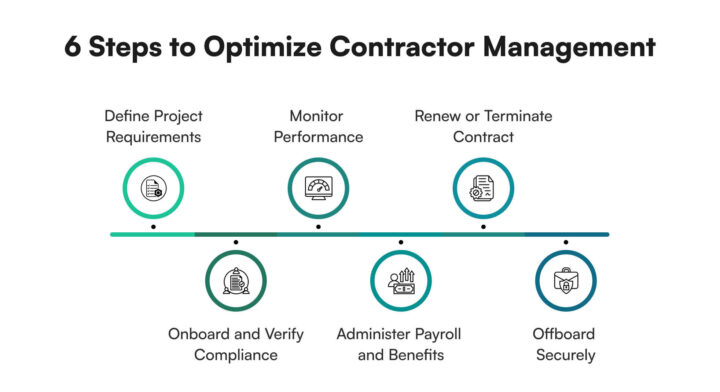Contractor management services provide businesses with tools to effectively oversee a contingent workforce, balancing flexibility with compliance and efficiency.
What is Contractor Management?
Contractor management is a comprehensive approach to overseeing and optimizing the use of external workforce resources. It encompasses a range of strategic and operational activities designed to maximize the value of contractor relationships while minimizing associated risks. Effective contractor management is crucial for businesses seeking to leverage external talent efficiently and compliantly.
Contractor Management Process
The contractor management process covers the entire lifecycle of a contractor’s engagement with your company. A well-structured process ensures efficiency, compliance, and optimal performance.
The contractor management process covers the entire lifecycle of a contractor’s engagement with your company. A well-structured process ensures efficiency, compliance, and optimal performance.
- Recruitment and selection. This stage involves defining project requirements, creating detailed job descriptions, and identifying the skills and experience needed. It includes sourcing candidates through various channels, screening resumes, conducting interviews, and performing skills assessments. The process may also involve background checks and reference verifications to ensure the contractor’s credibility and competence.
- Onboarding and compliance checks. This critical phase ensures all legal and company requirements are met before the contractor begins work. It includes verifying work eligibility, collecting necessary tax documents (e.g., W-9 forms for U.S. contractors), and ensuring the contractor has required licenses or certifications. The onboarding process also covers providing access to necessary systems, security briefings, and familiarization with company policies and procedures.
- Performance monitoring. This ongoing process tracks contractor output and quality. It involves setting clear performance expectations, establishing regular check-ins or progress reports, and implementing systems to measure productivity and quality of work. This may include using project management software, time-tracking tools, or custom KPI dashboards.
- Payroll and benefits administration. This stage manages all aspects of contractor compensation. It includes processing invoices, ensuring timely payments, and handling any tax withholding requirements. For certain types of contractors, it may also involve administering benefits such as health insurance or retirement plans, ensuring compliance with relevant regulations.
- Contract renewal or termination. This phase involves evaluating contractor performance against preset criteria to determine whether to extend, modify, or end the engagement. It includes conducting performance reviews, reassessing project needs, and negotiating new terms if the contract is to be renewed. If termination is necessary, this stage ensures all offboarding procedures are followed correctly.
- Offboarding. This final stage involves securely ending the contractor relationship. It includes revoking system access, retrieving company property, conducting exit interviews, and ensuring all deliverables have been received. It also involves updating internal records and complying with any legal requirements related to record-keeping or non-compete agreements.
Each stage requires attention to detail and adherence to established protocols. Effective management at each step minimizes risks and maximizes the value derived from your contractor workforce.
Contractor Management Outsourcing
Contractor management outsourcing transfers the responsibility of overseeing contract workers to specialized third-party providers, allowing businesses to concentrate on core operations while maintaining workforce flexibility.
Effective outsourcing streamlines operations, reduces administrative burdens, and ensures compliance with labor regulations. It’s particularly valuable for businesses lacking internal expertise in contractor management or those experiencing rapid growth.

Contact us for a customized solution for your business
When is Contractor Management Outsourcing Useful to a Business?
Contractor management outsourcing becomes a strategic necessity under specific business conditions. Recognizing these situations can lead to more efficient operations and improved bottom-line results.
Rapid business growth
When a company is scaling quickly, managing an expanding contractor base can become overwhelming for existing HR and administrative systems. Outsourcing provides the infrastructure and expertise to handle this growth efficiently. It allows for quick onboarding of new contractors, ensuring compliance and productivity are maintained even as the workforce expands rapidly.
Lack of internal expertise
Many companies, especially in industries where contractor use is not traditional, may lack specialized knowledge in contractor management. Outsourcing fills this gap by providing access to experts who understand the nuances of contractor regulations, tax implications, and best practices for managing a contingent workforce.
Focus on core activities
Managing contractors can be time-consuming, diverting resources from a company’s primary business functions. Outsourcing allows internal teams to concentrate on strategic initiatives and revenue-generating activities while leaving the complexities of contractor management to specialists.
Complex compliance requirements
Industries with stringent regulations or companies operating across multiple jurisdictions face intricate compliance challenges. Expert assistance ensures adherence to varied and often changing labor laws, tax regulations, and industry-specific requirements, minimizing the risk of costly violations.
Cost control imperatives
In times of economic pressure or as part of strategic cost management, outsourcing can provide better visibility into contractor-related expenses. It allows for centralized management of rates, helps identify cost-saving opportunities, and can lead to more efficient utilization of contractor resources.
Global expansion
As businesses expand internationally, managing contractors across different countries introduces new complexities. Outsourcing providers with global expertise can navigate diverse labor laws, tax systems, and cultural norms, facilitating smooth international operations.
Project-based workforce needs
Companies with fluctuating project demands benefit from outsourcing contractor management. It provides the flexibility to scale the workforce up or down quickly without the administrative burden of managing these changes internally.
Technology implementation challenges
Adopting and maintaining specialized software for contractor management can be costly and complex. Outsourcing providers often have advanced technological solutions already in place, allowing businesses to benefit from these tools without the associated investment and maintenance costs.
Risk management focus
With increasing scrutiny on worker classification and compliance, businesses may seek to mitigate risks associated with contractor use. Outsourcing to experts who stay current with legal requirements and best practices can significantly reduce the risk of misclassification, co-employment, or other legal issues.
Data-driven decision making needs
Companies looking to make more informed decisions about their workforce can benefit from the advanced analytics and reporting capabilities often provided by outsourcing services. These insights can help optimize contractor utilization, improve budgeting, and inform strategic workforce planning.
Identifying these trigger points in your business allows for timely implementation of contractor management outsourcing, potentially averting costly mistakes and inefficiencies.
Effective contractor management is a critical aspect of supply and production chains. It is essential to have experts who specialize in this. While some organizations may not have the resources to hire and retain such experts, outsourcing contractor management is a logical solution as the company grows.

What are the Challenges of Contractor Management Outsourcing?
While contractor management outsourcing offers significant benefits, it also presents challenges that require careful consideration and strategic planning.
Sharing sensitive information with third-party providers increases data breach risks. This challenge involves ensuring the outsourcing partner has robust cybersecurity measures in place, including encrypted data transmission, secure storage systems, and regular security audits. It also requires clear protocols for data handling and confidentiality agreements to protect proprietary information and personal data of contractors.
Outsourcing can create a buffer between your company and contractors, potentially impacting relationship management. This could lead to a disconnect in company culture transmission or delays in addressing contractor concerns. Overcoming this challenge involves establishing clear communication channels, regular check-ins with both the outsourcing provider and key contractors, and ensuring the provider understands and can represent your company’s values and expectations accurately.
Aligning outsourced services with existing internal systems can be complex and time-consuming. This may involve integrating different software platforms, aligning data formats, and ensuring seamless information flow between your company, the outsourcing provider, and the contractors. It requires careful planning, possibly involving IT teams from both organizations, and may necessitate custom API development or middleware solutions to bridge gaps between systems.
Internal teams may resist the change, fearing job losses or reduced influence. This challenge requires a comprehensive change management strategy, including clear communication about the reasons for outsourcing, its benefits to the organization, and how it will impact (and potentially benefit) existing roles. It may also involve retraining or redeploying affected staff to higher-value activities within the organization.
Ensuring consistent, high-quality service from the outsourcing partner is crucial but can be challenging. This involves setting clear performance metrics for the outsourcing provider, regular performance reviews, and having escalation procedures in place for when service levels drop below agreed standards. It may also require periodic audits of the provider’s processes and outputs to ensure they meet your company’s quality expectations.
Contractors may feel disconnected or less valued when managed through a third party. Addressing this challenge involves ensuring the outsourcing provider has strong contractor engagement practices, clear communication channels, and the ability to represent your company’s culture and values effectively to maintain contractor satisfaction and retention.
Addressing these challenges head-on through careful provider selection, clear communication, and robust oversight mechanisms is crucial for successful contractor management outsourcing.
Trust GEOR to Manage Contractors
Partnering with a CMO provider offers numerous advantages for businesses utilizing independent contractors or freelancers. GEOR delivers expert contract management, significant cost reductions, enhanced flexibility, and improved operational efficiency.
We, as a CMO provider, enable companies to scale their operations while minimizing complications and maximizing the value of outsourced talent. This benefit becomes particularly crucial when a business expands into international markets.
Conclusion
Contractor management services represent a strategic tool for businesses navigating the complexities of a flexible workforce. Understanding the process, recognizing when outsourcing is beneficial, and addressing potential challenges allows businesses to leverage these services to enhance efficiency, ensure compliance, and focus on core competencies.
The evolving nature of work demands adaptive management strategies. Contractor management services offer a pathway to maintain agility while minimizing risks associated with a contingent workforce. As businesses continue to rely on specialized, project-based talent, the role of effective contractor management will only grow in importance.
Implementing contractor management services or outsourcing these functions requires careful consideration of your business needs, resources, and long-term strategy. When executed effectively, it can provide a significant competitive advantage in today’s dynamic business environment.




